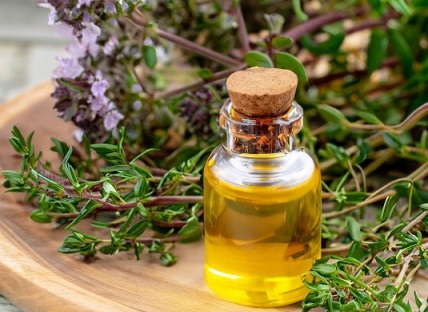Protective Properties of Thyme Essential Oil Against Foodborne Pathogens Such as Salmonella and Listeria
Nikhil Prasad Fact checked by:Thailand Medical News Team Dec 29, 2024 3 months, 2 weeks, 1 day, 23 minutes ago
Health News: Foodborne illnesses remain a pressing global challenge, affecting millions annually. Among the culprits are pathogens such as Salmonella spp., Listeria monocytogenes, and Yersinia enterocolitica. These microorganisms contaminate food, leading to conditions that range from mild gastrointestinal discomfort to severe health complications. With the increasing prevalence of antibiotic-resistant bacteria and consumer demand for natural alternatives, scientists are exploring innovative solutions to combat these threats. One promising avenue is the use of essential oils derived from plants. This
Health News report delves into groundbreaking research that investigates thyme essential oil (Thy-EO) as a natural antimicrobial agent against foodborne pathogens.
 Protective Properties of Thyme Essential Oil Against Foodborne Pathogens
Protective Properties of Thyme Essential Oil Against Foodborne Pathogens
Such as Salmonella and Listeria
The Role of Thyme Essential Oil
Thyme essential oil has long been recognized for its therapeutic properties, including anti-inflammatory, antioxidant, and antimicrobial effects. A recent study spearheaded by researchers from the University of Naples “Federico II” and the University of Sannio in Italy provides compelling evidence for its efficacy against key foodborne pathogens. The study aimed to evaluate Thy-EO's antibacterial properties, investigate its mechanisms of action, and assess its potential as a safer alternative to synthetic preservatives.
Study Design and Methods
To determine the antimicrobial potential of Thy-EO, the researchers conducted extensive in vitro tests against Salmonella enterica, Yersinia enterocolitica, and Listeria monocytogenes. These tests involved measuring the Minimum Inhibitory Concentration (MIC) and Minimum Bactericidal Concentration (MBC), which reflect the lowest concentration needed to inhibit and kill bacterial growth, respectively. Additionally, the study examined Thy-EO’s effects on bacterial membrane permeability - a key factor in understanding its mechanism.
Key Findings from the Study
The results revealed that Thy-EO exhibited potent antibacterial effects across all tested pathogens:
-MIC and MBC Values:
For S. enterica, the MIC was determined to be 0.4 µL/mL, with an MBC range of 0.4 to 0.5 µL/mL.
For Y. enterocolitica, Thy-EO demonstrated a MIC of 0.2 µL/mL and an MBC between 0.4 and 0.5 µL/mL.
L. monocytogenes was particularly susceptible, with a MIC as low as 0.125 µL/mL and an MBC range of 0.2 to 0.3 µL/mL.
These values highlight Thy-EO's strong bactericidal capabilities, often at lower concentrations compared to synthetic agents.
-Membrane Disruption:
The integrity of bacterial cell membranes was significantly compromised upon exposu
re to Thy-EO. Researchers observed increased leakage of genetic materials (DNA) and proteins from the cells, confirming membrane permeability disruption. This mode of action not only inhibits bacterial growth but also ensures their irreversible damage.
-Time-Kill Assays:
Thy-EO exhibited rapid bactericidal activity, achieving complete bacterial eradication within two hours of treatment in most cases. This swift action underscores its potential to be an effective antimicrobial agent for real-time food safety applications.
-Volatile Effects:
Beyond its liquid phase applications, Thy-EO’s volatile compounds were also tested. These compounds demonstrated significant antimicrobial activity, particularly against Y. enterocolitica and L. monocytogenes, even in vapor phase experiments. This finding opens the door for innovative applications such as packaging technologies that integrate Thy-EO vapors to inhibit bacterial contamination.
Implications for Food Safety
The ability of Thy-EO to target bacterial membranes and its demonstrated efficacy at low concentrations position it as a viable alternative to conventional preservatives. Unlike synthetic chemicals, Thy-EO offers a natural and consumer-friendly option with negligible side effects. Moreover, its mechanism of action - membrane disruption - reduces the likelihood of bacterial resistance, a growing concern in the food industry.
Future Applications
The versatility of Thy-EO extends beyond food safety. Its incorporation into food packaging, as an additive in preservation techniques, or as a standalone antimicrobial spray could revolutionize how we protect perishable goods. Additionally, its pleasant aroma and natural origin align with the rising consumer preference for sustainable and green products.
Conclusions and Challenges
The study conducted by Italian researchers underscores the immense potential of thyme essential oil as a powerful antimicrobial agent. Its low MIC and MBC values, coupled with its ability to disrupt bacterial membranes, highlight its effectiveness against dangerous foodborne pathogens. Furthermore, its dual action in both liquid and vapor forms offers diverse applications in ensuring food safety.
However, while the findings are promising, certain challenges remain. Essential oils, including Thy-EO, can vary in composition depending on factors such as plant origin and extraction methods. Ensuring consistency and stability in commercial applications will require further research. Additionally, potential interactions with food properties, such as taste and aroma, must be carefully evaluated to maintain consumer acceptability.
In conclusion, thyme essential oil holds the promise of becoming a cornerstone in the fight against foodborne illnesses. Its natural origin, antimicrobial potency, and versatility make it an ideal candidate for replacing synthetic preservatives.
The study findings were published in the peer-reviewed journal: Microorganisms.
https://www.mdpi.com/2076-2607/13/1/37
For the latest
Health News, keep on logging to Thailand Medical News.
Read
Also:
https://www.thailandmedical.news/news/fermented-bitter-leaf-as-a-game-changer-against-antibiotic-resistant-escherichia-coli-and-salmonella-typhi-bacteria
https://www.thailandmedical.news/news/new-study-unveils-the-power-of-rosmarinic-acid-in-combating-salmonella-infections
https://www.thailandmedical.news/news/emergence-of-new-salmonella-strains-in-hungary
